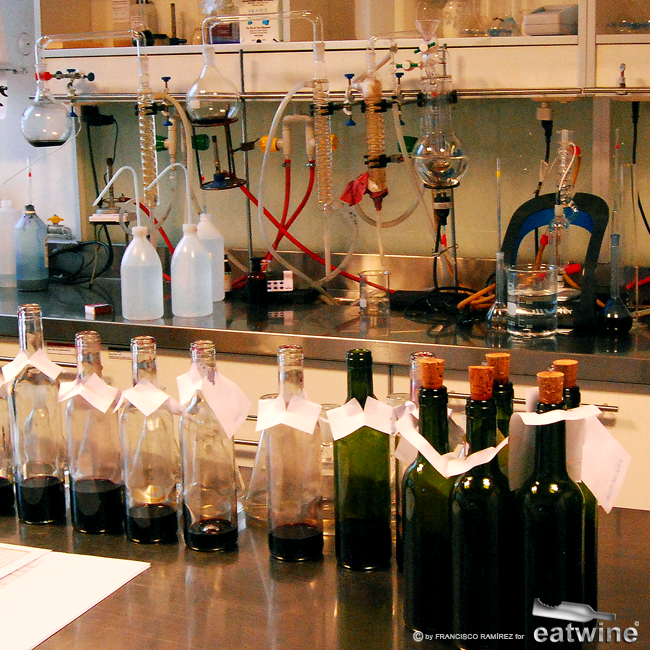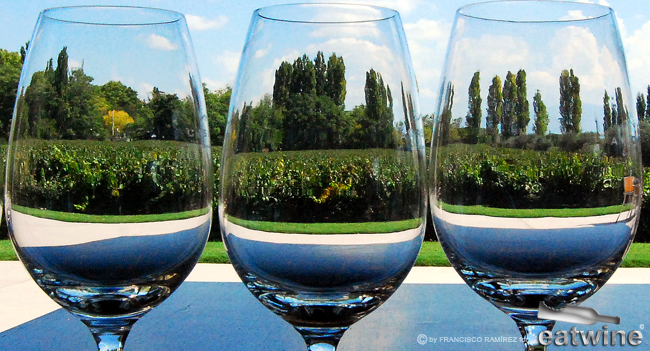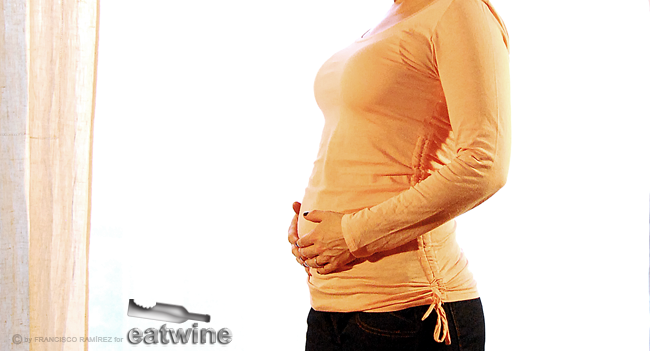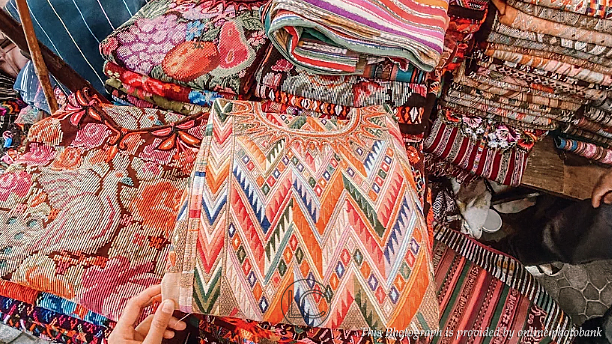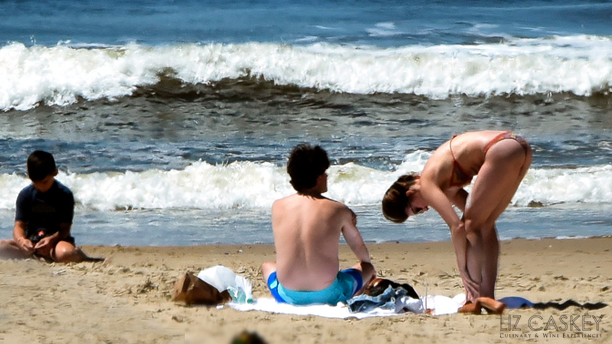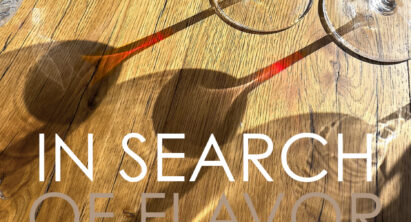If you drink alcohol while pregnant, people often feel free to judge you. This topic has become a very relevant theme for me now that I am 24 weeks (six months) pregnant, given that my profession revolves around travel, food, and wine in South America. The morning I found out I was expecting, while on vacation in Europe, I had been consuming about 2-3 daily glasses of wine during the past 2 weeks. That came to a screeching halt until I could meet with my doctor upon return (well, minus one small glass of champagne on the flight home). Much to my surprise, he was extremely laid back about the whole thing, as most Chilean obstetricians tend to be. He advised against drinking much in the first trimester, but my wine tastings (spitting everything) were fine and from the second trimester on, a few glasses or so of wine per week was no problem. He was far more concerned about the consumption of raw foods and not taking certain drugs like ibuprofen—and me staying relaxed. It became very apparent that wine consumption during pregnancy in Chile was very different than the experiences relayed from my US-based girlfriends. I sensed this was a highly cultural topic with “taboo” factors and attitudes varying greatly.
As I dug more into the topic to set up my own parameters that would form the base of my experience during this pregnancy, I outreached to a few female colleagues here in Chile working in the wine world that already had children and had consumed wine throughout their pregnancies, giving birth to healthy babies. Their experiences, along with Emily Oyster’s highly eye-opening book, Expecting Better, that blasts open vague pregnancy “recommendations” and “myths”, has formed the base of my strategy for consuming wine while pregnant.
As Oyster points out, Draconian restrictions stating, “No amount of alcohol is safe”, have their own problems. While there is no question that heavy drinking during pregnancy is bad for you and your baby, this does not automatically imply that an occasional glass of wine is a problem. What about overeating too much of certain food and having too much potassium or magnesium in your system? What about all the junk and chemicals in the SAD (Standard American Diet)?
The fact is that here in South America, similar to Europe, most doctors are much more permissive about light drinking during pregnancy. It seems that some North American doctors must think that most women exhibit no self-control and wouldn’t be able to stop at just one glass. Really? Thanks for the vote of confidence. Well, Chilean doctors here are cool with a few glasses of wine per week, and even in restaurants, I have rarely had an eyebrow raised when ordering with dinner. However, the objective is enjoyment and savoring the wine with food, a very different attitude than pulling up a stool at bar for a drink. Many doctors, mine included, often refer to those times when our mothers or grandmothers would down drink malta con huevo (malt with eggs), or gin & tonics, and drank with no second thought.
Another point that Expecting Better makes is that the glass of wine it is not directly channeled to the fetus. The alcohol from the wine passes into the bloodstream and through the liver, which processes it into a chemical called acetaldehyde and then into acetate. The blood shared between the mother and baby through the placenta can have acetaldehyde remaining in blood stream that could be shared with the baby. The baby’s liver can process some alcohol but not as much as an adult. So, as the author maintains, by sipping small amounts of wine very slowly, your liver can keep up and no acetaldehyde gets sent to the fetus. Speed, and drinking wine with food, really do matter.
How Do Wine Pros Do It?
What about those women in the wine industry? Think of all the mothers worldwide that are wine journalists, winemakers, work for wineries, and whose careers depend on tasting wine, all the time, for their job. Do they take a nine-month hiatus? Um, NO. They employ a strategy and most share the opinion that moderation is key.
Chilean wine journalist Ana Maria Barahona, who pens the best-selling wine guide Mujer y Vino is expecting her second child in May. She has continued her normal, busy schedule of weekly tastings for both annual wine guide and tastings for La Cav magazine. How does reconcile tasting while pregnant? She tastes, spits, rinses and rests as needed. She asserts that every taster/mother knows her own body and limit. She does admit that she did cut back her consumption of wine during pregnancy but will indulge in a glass on occasion with meals (she’s completely cut out, however, all spirits/hard alcohol). In fact, she cites that her OB-GYN is a total wine lover and gave her no restrictions other than common sense. Ana Maria firmly believes that wine is a “food” so you cannot just look at wine as alcohol alone. In her opinion, wine has documented health benefits and in moderation, does not hurt babies. What does she have to base this comment on? Meet her adorable seven year old son, Max, who’s a perfectly healthy, happy, intelligent little boy. From the day he was born, he’s seen his mom working in wine and he loves to smell the wines alongside food. Do we have a budding wine connoisseur in the making? Most definitely…and wine will be an important part of his life—because it is for her.
Marie Chaisson, an independent business consultant, who worked as an export manager for Estampa Winery during her first pregnancy, took a slightly different approach. Her palate completely changed while pregnant, and as she said, “I became pretty much worthless in tastings.” As she remembers, “we had a huge tasting (40+ wines) with our winemaker to compare our wines against other Chilean wines in the same category. I kept asking, ‘Don’t you think this wine is off?’” and our winemaker kept shaking his head. It was then that I realized that it was ME that was off! Once I realized my palate was shot, it got me off the hook with clients and journalists.”
Marie drank wine mostly in the first and second trimester, necessary both for her job and her own daily routine. She put her own self-imposed limit around 2 glasses a week. During professional wine tastings, she would spit everything because she calculated she would absorb about half a glass. “Sometimes”, as she noted, “I would have a glass at dinner, just because it was so hard to break the habit!” By the time my third trimester came around, she decided to stop the wine since even one glass made her fell sub-par. Interestingly enough, Marie mentioned that in Chile she feels people judge rigorous exercise regimes more harshly than wine drinking (I completely second this notion!). Most importantly, she believes that a happy and relaxed mother leads to a relaxed baby and most doctors agree that it’s better to have a glass of wine and relax than transmit that stress to the baby. Is the proof in the pudding? Marie drank more wine and did yoga in her first pregnancy with her daughter, Juliette, and had a “Zen baby”. With her second child, she didn’t do much yoga nor drink much wine after changing industries and her son was born very nervous, which eventually wore off after a few months.
So what has my experience been thus far? After finding out the happy news of the little one coming, I barely drank any wine in the first trimester. This was partially because of my doctor’s suggestion, knowing it was the base for everything, and honestly, feeling very tired and nauseated for a good stretch from 6 to 12 weeks. Even over the holidays, when we opened nice bottles of wine with family and I was feeling tempted, the moment the wine hit my lips it tasted off. The wine felt hot and I knew it was my body’s own way of telling me to avoid it for the time being. Was this right or wrong? No, it was simply my experience.
As soon as I hit 13 weeks, the nausea and tiredness fog miraculously disappeared and I had a surge of energy like no other. The desire to sip wine returned. I resumed going to tastings and having an occasional glass of wine, particularly Champagne, a favorite. My nose was like a bloodhound in tastings. I could pick up aromas and nuisances never before sensed. I savored and spit and rinsed and felt glad to at least be able to partake. When I did decide to have an occasional glass, I sipped smartly and slowly with food, always in ½ glass pours and measuring if I really wanted the second half. Often, I realized, I didn’t. But I loved not giving up the ritual, not sacrificing what wine means for me as a way to share culturally. There are many nights my husband opens a bottle and I pour myself a glass of fizzy cranberry juice sweetened with stevia or rooibos iced tea. When I want a little though, there is no guilt, no judgment, just enjoyment.
My Tips for Wine During Pregnancy:
Spit during a tasting: This sounds like a no-brainer but I will repeat it because it can feel like sacrilege, especially if you taste very fine wines (trust me, I’ve been there). If there’s a real knock out wine, like me swooning and wanting to buy a case of the special vintage for my child-in-utero, I will let myself swallow one sip. Ok, maybe two. It must be clearly memorable. Otherwise, as I move the wine around my mouth and oxygenate, I really focus on the present and savoring the flavor. It is possible to appreciate flavor without activating the swallowing instinct.
Drink lots of water: This goes before and after the tasting. Be sure to snack as needed on the water crackers. In some cases, I often will actually rinse my mouth out after each wine with water to clear out any residual alcohol clinging to the palate before drinking the water since it can add up, particularly in the lengthy professional tastings.
Know your limits: Most people can feel alcohol in their system after a couple sips. It comes on first as a slight warm sensation in the stomach, face becoming flush, then that little buzz starts. My personal guidance system is to not feel any effect from the alcohol. In the very few times I have felt it (often when needing to eat more), I stop immediately, eat something, drink more water and put the wine aside and take a little break.
Measure your pour: A lot of restaurants these days pour larger-than-average wine glasses. I measured a standard glass of wine and found many run around 5 ounces versus the standard 4 ounces. In deeming what seemed to be my own “happy” place in having a small glass of while with food, I poured out 2 ounces (1/2 glass) and got to know what this looked like in several different glass formats. This was the amount I was comfortable drinking slowly, and often never want more. For my birthday, I was looking forward to a glass of French champagne at Baco so the bar served me half a chilled glass with the appetizer, and the other half with my main course. Perfect.
Sip slowly and drink wine with food: I cannot emphasize this enough. Of all of the things I took away from Emily Oyster’s book these recommendations really hit home. I do not drink wine on an empty stomach, nor would I ever go to a tasting in that state. I sip slowly. I relish each little sip. Granted, I won’t lie that I am looking forward to that day in August or early September when I can drink a big glass, maybe even two, of wine but for now, it is perfectly fine. My husband has confessed to loving this new “Liz wine-drinking scenario” since he has no problem in assisting in finishing my share of the bottle.
Make that wine count: This may be my thing as a wine lover, but since I have so little these days, I make it count. If I know I have a dinner party or special occasion, I will save it on another night and drink water. When I do imbibe now, I only drink fine wine. The wines must be amazing, delicious, something truly exceptional to pass my lips if swallowing. Little Baby seems to be in agreement with this strategy. The few times I have swallowed a sip or two in tastings, there’s been some “dance moves” and kicks with very notable reference wines like Almaviva, Cheval des Andes, and Amayna’s sultry Pinot Noir. Obviously we have a wine lover in utero.
Yes, the last photo is my petit baby belly at 22 weeks!

